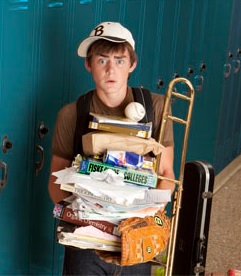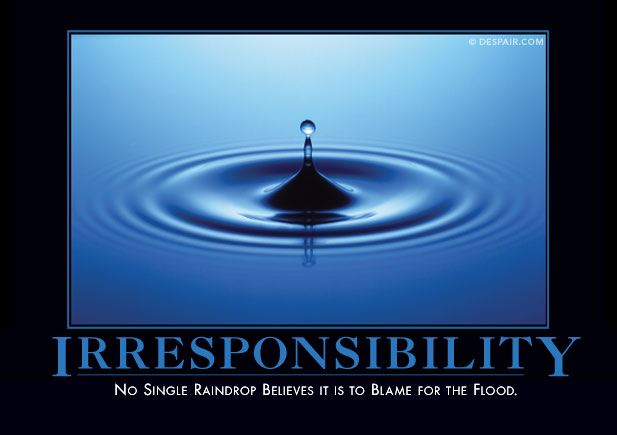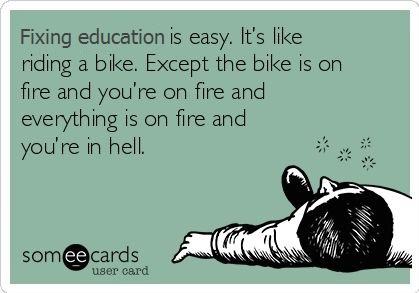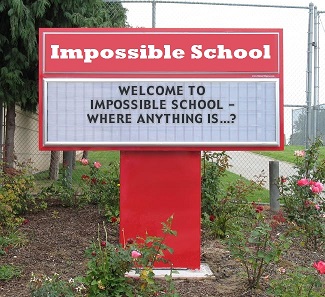 I don’t do many numbered lists, but I notice they’re going out of vogue and figured that was the perfect time to do one more. It’s like wearing cargo shorts, or getting excited about Kings of Leon.
I don’t do many numbered lists, but I notice they’re going out of vogue and figured that was the perfect time to do one more. It’s like wearing cargo shorts, or getting excited about Kings of Leon.
Go on – judge me.
Anyone in education for more than a week is deluged with clichés and presumed bits of wisdom which rarely play out as promised. They’re not usually malicious, but neither are they reliable. Like a mirage, perceived substance vanished when you’re most desperately relying on them.
In an effort to reduce the volume of sand in our collective edu-eyes, here’s the first half of my Top Ten Education Myths Countdown.
 #10 – The students will make you crazy. There are certainly times that my students leave me frustrated, bewildered, or even frothing towards neurosis. They can be a difficult lot, no matter how many inspirational memes you retweet each week.
#10 – The students will make you crazy. There are certainly times that my students leave me frustrated, bewildered, or even frothing towards neurosis. They can be a difficult lot, no matter how many inspirational memes you retweet each week.
That being said, it’s not the kids who truly hold the power to undermine your sanity – it’s the adults. The higher up the ladder, the more likely they are to zap you with the crazy ray when it’s least welcome and not at all necessary.
If you’re not nodding in silent assent as you read this, thank your leadership effusively and often. They’re the exception.
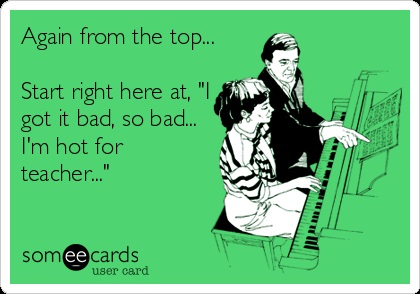 #9 – The teacher students like the best is the best teacher. This is not without elements of truth. It’s difficult to reach kids who DON’T like you, and teachers who are comfortable with and care about their students tend to give more, and get more from them.
#9 – The teacher students like the best is the best teacher. This is not without elements of truth. It’s difficult to reach kids who DON’T like you, and teachers who are comfortable with and care about their students tend to give more, and get more from them.
But a teacher may be wildly effective because they’re consistent, know exactly what they’re doing, and demand big things of those not accustomed to being considered so very full of possibilities. They may receive ZERO Starbucks cards at the holidays but deep thanks from former students years after they’ve moved on and have a little perspective.
Conversely, there are very ‘cool’ teachers who are strong on the bonding but weak on the ‘challenging’ or the ‘knowing stuff’. Correlation is not causation –you may know many good teachers who are totes down with the kids, but that doesn’t make it a ‘rule’.
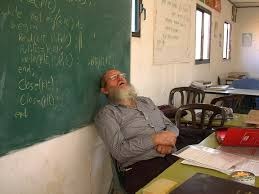 #8 – Teachers are afraid of accountability / Teachers’ unions are there to make sure their members aren’t held to any real standards. We, as a profession, are largely culpable for this perception. There are few things more horrifying to watch than a teachers’ strike on the news – horrible slogans, bad hair, and chants beginning with “2, 4, 6, 8…”
#8 – Teachers are afraid of accountability / Teachers’ unions are there to make sure their members aren’t held to any real standards. We, as a profession, are largely culpable for this perception. There are few things more horrifying to watch than a teachers’ strike on the news – horrible slogans, bad hair, and chants beginning with “2, 4, 6, 8…”
You’d think we were collectively thrown off of American Idol during Hollywood Week and just couldn’t accept that our slow, tender version of “All About That Bass” just wasn’t up to snuff.
But think about your elected leaders – the ones who make you go nuts on Facebook or Twitter with their inane comments and proposals. Better yet, recall the most difficult relationship from which you’ve ever had to extricate yourself, especially if it involved being judged or misconstrued – the more irrational the better. Ask yourself if you’d want that person in charge of your income, your profession, or your major life decisions. How about letting them tell you how to raise your kids? No?
That’s what it’s like when people with zero track record of having any idea what they’re talking about continue to insist on telling us what good teaching looks like, how to handle our students, etc. And they have power over our meager lil’ paychecks as well.
It’s enough to make those horrible slogans seem encouraging.
 #7 – Teachers have it easy / Teachers work longer and suffer more nobly than any other profession in the history of mankind. We may overreact to tired old cracks about ‘having summers off’ and whatnot, but far sillier are our efforts to establish that we do, in fact, martyr ourselves in ways that leave slackers like Gandhi and Mother Theresa bathed in shame and inadequacy.
#7 – Teachers have it easy / Teachers work longer and suffer more nobly than any other profession in the history of mankind. We may overreact to tired old cracks about ‘having summers off’ and whatnot, but far sillier are our efforts to establish that we do, in fact, martyr ourselves in ways that leave slackers like Gandhi and Mother Theresa bathed in shame and inadequacy.
There’s that email showing what we’d make if we were babysitters (something in the hundreds of thousands annually), and all those tortured tales about our 60-hour weeks and the resulting personal dysfunctions. “Yeah, but did MLK every have to buy his own SCHOOL SUPPLIES?!?”
I’m not saying no one does it that way – just that it’s not the norm. Nor is it healthy for extended periods. Sure, I put in plenty of hours before 8:00 and after 3:00 prepping, grading, and occasionally trying to learn a few new things.
But then I go home. I read books. I watch hockey. I have a family. So should you.
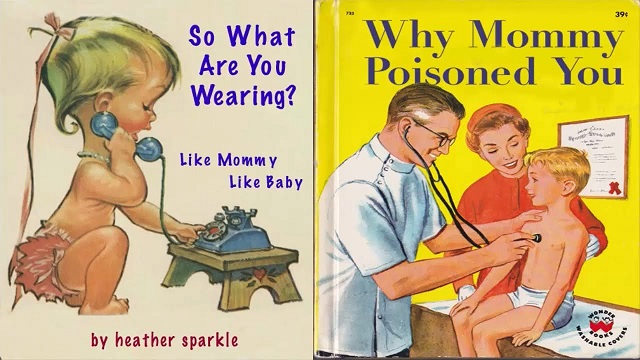 #6 – Such and such kids won’t learn no matter what you do.
#6 – Such and such kids won’t learn no matter what you do.
Maybe. Or maybe I just suck and haven’t tried the right thing. Maybe if we could find a better setting – more structured, less strict, different peer group… Maybe if more of our faculty looked like him, or more of our curriculum mattered to her.
Then again, maybe not. Sometimes it’s not us – it’s them. The moment this becomes an excuse to write them off, however, you’re doing it wrong.
Don’t beat yourself up over every kid you can’t reach – chances are their issues go way deeper than you can spelunk in an hour a day with 152 others to inspire. But if that ever stops bothering you, eating at you, making you question everything you thought you liked about yourself… well, then you suck.
Time to let you in on a little secret.
I know exactly what my Top 3 are going to be, but I’m torn about #4 and #5. I have some ideas, but I’d like to know what YOU’D put on this list before I finish it in a few days. Comment below, or email me if you prefer.
Bonus points if your suggestion is already one of my Top 3.
RELATED POST: Top Ten Education Myths (Part Two)
RELATED POST: The Seven Reasons Every Teacher MUST Know Why Kids Learn!
RELATED POST: Seven Steps to Personal and Professional Growth, Feat. Wild Cherry


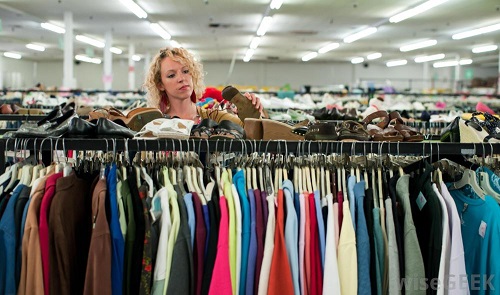 You get tired of cautious price-checking as you shop for groceries, or putting on your best face while you limit how many back-to-school clothes can come from Target before going back to the… usual places. Your friends don’t mean any harm when they share their vacation stories or invite you to that restaurant they chose to ‘accommodate your budget,’ but – SERIOUSLY? They don’t even have a kids’ menu there!
You get tired of cautious price-checking as you shop for groceries, or putting on your best face while you limit how many back-to-school clothes can come from Target before going back to the… usual places. Your friends don’t mean any harm when they share their vacation stories or invite you to that restaurant they chose to ‘accommodate your budget,’ but – SERIOUSLY? They don’t even have a kids’ menu there!
 But I’m going into 2016 with an open mind. It’s a new year, a new legislative session, and a new round of draconian budget cuts. Why not new ideologies and understandings as well? Maybe I’m wrong about some things. Maybe we’re ALL wrong about any NUMBER of contentious issues.
But I’m going into 2016 with an open mind. It’s a new year, a new legislative session, and a new round of draconian budget cuts. Why not new ideologies and understandings as well? Maybe I’m wrong about some things. Maybe we’re ALL wrong about any NUMBER of contentious issues.  I’m ready to sincerely consider your examples, and their stories. Seriously.
I’m ready to sincerely consider your examples, and their stories. Seriously.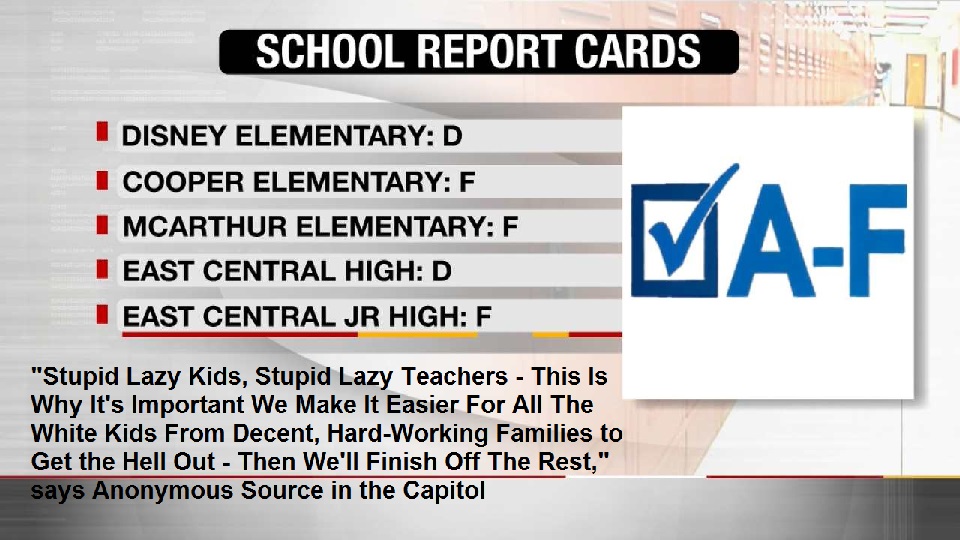 But both the OKSDE website and the annual rhetoric from our State Legislature is clear – schools landing on the low end of that A-F list will receive increased support – training – mentoring – guidance – resources – from the state, yes? There’s a reference to using ‘spurs’ on us I’m not crazy about, but other than that…
But both the OKSDE website and the annual rhetoric from our State Legislature is clear – schools landing on the low end of that A-F list will receive increased support – training – mentoring – guidance – resources – from the state, yes? There’s a reference to using ‘spurs’ on us I’m not crazy about, but other than that…  I know there’s a balance of sorts, and that high enough tax rates kill growth. But may I please see examples of how cutting the obligations of the most prosperous has led to more jobs, more state revenue, more services, more prosperity – in OUR state, recently?
I know there’s a balance of sorts, and that high enough tax rates kill growth. But may I please see examples of how cutting the obligations of the most prosperous has led to more jobs, more state revenue, more services, more prosperity – in OUR state, recently? 


